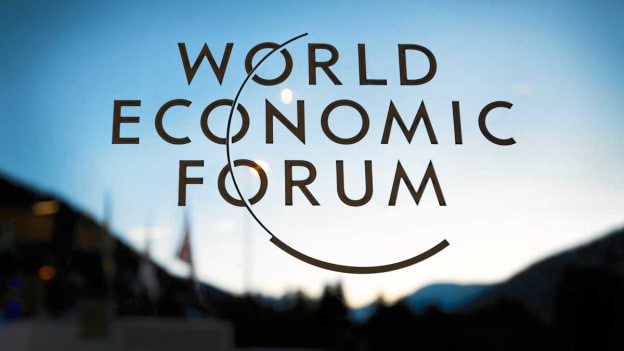Highlights of the WEF’s Davos Agenda 2021

This year, the annual WEF Davos summit has been postponed to May 2021 and moved from Switzerland to Singapore due to ongoing concerns around COVID-19. This week, however, an Agenda-setting event was held virtually as a precursor to the later summit, and featured over 100 video sessions that set the stage for what’s to come. Along with addresses from influential leaders and thinkers such as Emmanuel Macron, Lee Hsien Loong, Suga Yoshide and Greta Thunberg - which addressed the broader, pressing issues facing the world - there was also a thematic subset focused specifically on society & the future of work.
Via video links, business leaders, politicians, CEOs, leading thinkers and heads of industry gathered to discuss how the crisis had exacerbated existing inequalities, accelerated digitisation and automation and caused a seismic shift in the world’s labor market. Speaking on Thursday, Director-General of the International Labor Organization, Guy Ryder said “we've estimated that global working hours have gone down by 8.8 percent, the equivalent of 225 million full-time jobs lost around the globe,” and cautioned to look out for “aggravation of polarization of labor markets and growing inequality.”
However, there were also many causes for optimism up for discussion too, with investments in digitisation, retraining, learning and reskilling offering great potential for recovery and returns. Here are some key highlights:
Digitisation and Job Creation
According to new ManpowerGroup research released in conjunction with the WEF Davos Agenda Event, rapidly-digitising companies are also the ones creating jobs faster. The research shows that almost 86% of companies that have accelerated digitisation will expand headcounts and add roles, while just 11% of employers who are sticking to or reducing automation plans will also add roles. In their survey of 26,000 employers in more than 40 countries, researchers found 38% of organisations are speeding up automation plans, while 17% have put their plans on hold.
Globally, employers in Germany, Austria, Japan, and Italy report the greatest acceleration in automation, while these developments are reportedly slower in the US, France and the UK.
“Today, technology breakthroughs are driving mass vaccination programmes, workforce transformation, and flexibility, plus a call for the better work-life blend, more upskilling, and greater autonomy over how, when, and where work gets done,” said Jonas Prising, Chairman and CEO of ManpowerGroup.
“One year into the pandemic though, we are seeing the emergence of a K-shaped recovery,” Prising said. “Some industries and people are bouncing back faster and better - while others are at risk of falling further behind. Helping people to upskill and reskill for in-demand roles in this Skills Revolution remains the defining challenge of this decade,” Prising went on to say.
The Reskilling Revolution
The week kicked-off with an all-star panel discussion on the urgent need to address skills gaps and what can be done to bridge these divides.
Citing research conducted in partnership with PwC, WEF Managing Director Saadia Zahidi said: “This is not just an expenditure, this is actually an investment. We can add $6 trillion to the global economy through upskilling investments by 2030. Of course, the dollar value there is incredibly important, but the social repercussions are even more so.” This research also points to potential growth output of 7.5% in China, 6.8% in India and 3.7% in the US if upskilling initiatives are successfully executed. The full report, entitled ‘Upskilling for Shared Prosperity,’ outlines how critical retraining will be recovery, covering “upskilling’s advantages, including wider social benefits triggered by the development of specific skills that will prove beneficial for the future success of the global economy.”
LinkedIn CEO Ryan Roslansky joined Zahidi on the panel and outlined how tech and digitisation will be huge drivers of new jobs in the near futures.
“COVID has compressed years of digital transformation over the last couple of months,” Rolansky said. “It’s no surprise we’re seeing a huge move into digitisation.” Rolansky says LinkedIn projects 150 million new tech jobs to be created globally over the next five years, including in software development, product management and AI. There is also increased demand around pandemic-driven roles in healthcare and education.
Rolansky also highlighted how workers displaced by COVID-19 may have more skills than they previously believed. “Transitioning into new roles is possible,” he said. “Because skills are the currency.” Rolansky pointed out that over 75% of people who are coming to these new roles are transitioning from different functions. “For example, a food server has 71% of the skills you would need to transition into a customer service role. Similarly, someone like a bartender has about 46% of the skills you would need to move into a sales role.” Rolansky added that it’s now easier than ever to acquire these skills and proficiency is not just driven by pedigree and education alone.
The Equalising Potential of Soft Skills
Even before the crisis, the value of uniquely human soft skills was being lauded by people and work leaders across the globe - particularly in the face of increased automation. Highlighting workers’ soft skills can also be a key pathway to overcoming growing inequalities, as Frida Polli, the co-founder and CEO of Pymetrics explored in her talk on Skilling the Global Workforce. Pymetrics is a talent matching platform that uses AI to mitigate bias in hiring practices, leading to more diverse teams of top performers. Commenting on the power of soft skills, Polli said that they “have a fantastic equalizing potential, and however you’re thinking about looking at soft skills, think about them in that way.” Polli added that “if we really want to mitigate growing inequality” we should look at “people’s potential through soft skills.” This can be done through assessment of soft skills, rather than depending on resumés to reveal “high aptitude for high-skill jobs.”
There is little doubt the world is at a key turning point in history, and it will take many years for the true, lasting impacts of the crisis to emerge clearly. For now, it appears the world leaders and Davos attendees are focused on the lessons learned from the crisis and how to leverage this learning into building back better.
















